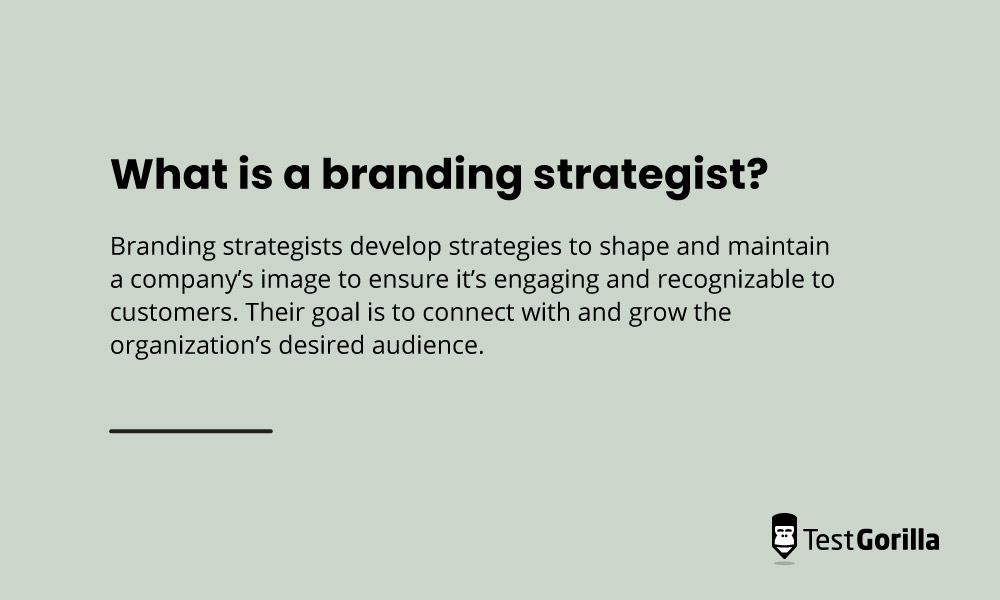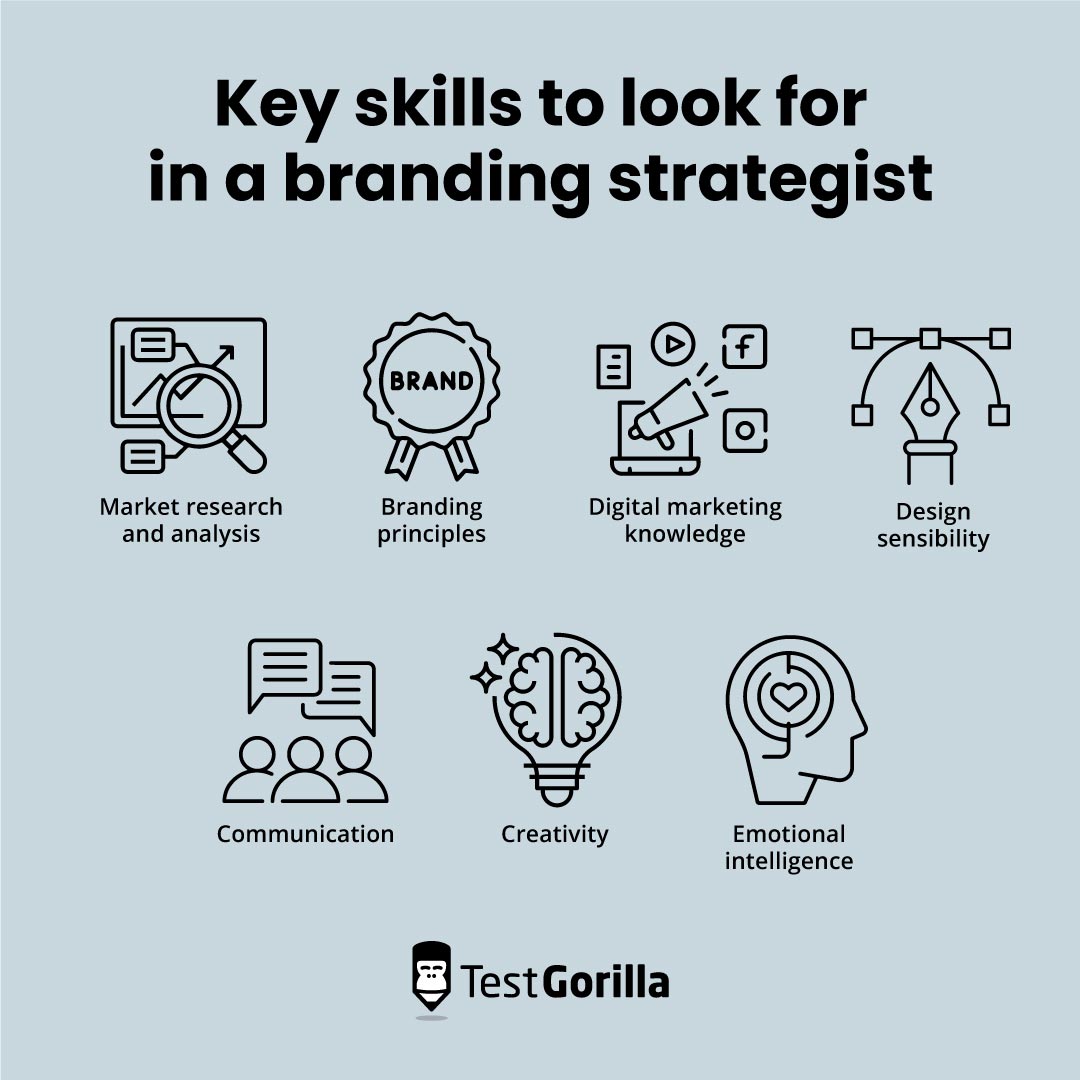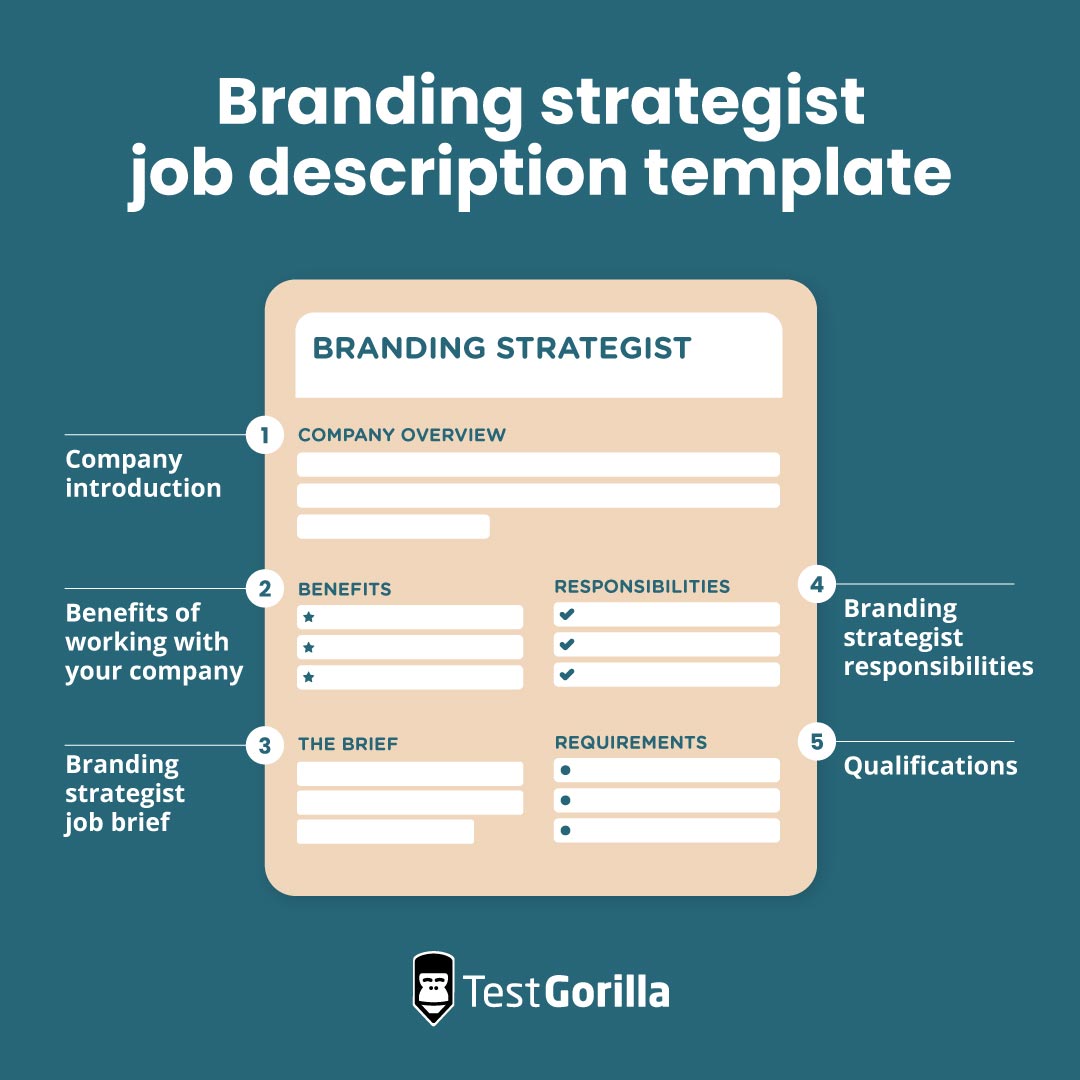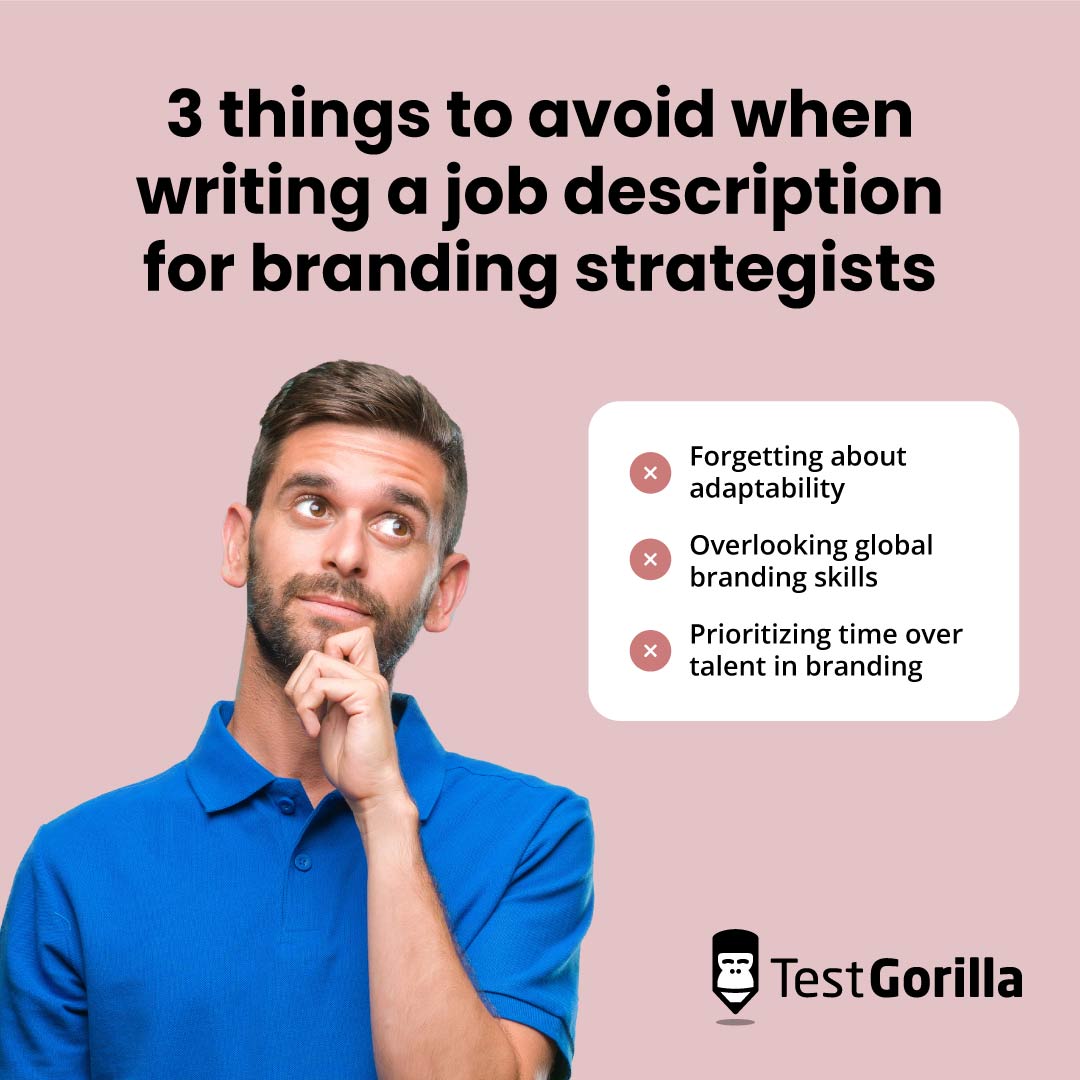Branding strategists are crucial for defining and promoting an organization's identity in a competitive market. They use strategies like market research, branding principles, and creative campaigns to connect with target customers and outshine competitors.
The first step in hiring a skilled branding strategist is to craft a well-written job description to attract the right applicants. However, this can be a struggle. You might be unsure how to convey your company culture and brand values or what qualifications and skills you should highlight.
Luckily, we’re here to help.
Below, we walk you through how to write a strong branding strategist job description, the key skills to look for, and how to assess your branding strategist candidates.
Table of contents
- What is a branding strategist?
- Key skills to look for in branding strategists
- How to write an effective branding strategist job description
- Branding strategist job description template
- 3 things to avoid when writing a job description for branding strategists
- Next steps: Attracting and assessing branding strategist candidates
- FAQs
- Hire talented branding strategists with TestGorilla
What is a branding strategist?
Branding strategists develop strategies to shape and maintain a company’s image to ensure it’s engaging and recognizable to customers. Their goal is to connect with and grow the organization’s desired audience.
They analyze market trends, audience behavior, and competitive landscapes to create branding messages and campaigns. Effective brand strategists know their product and target audience well, helping them create digital content, print ads, and in-store product placements that boost sales.
Branding strategists are closely related to marketers, as their focus on building strong brand messaging plays an essential role in larger marketing efforts.
Key skills to look for in branding strategists
Branding strategists have a blend of hard and soft skills, outlined below.
Market research and analysis: Ability to gather, analyze, and interpret data related to consumer behavior, market trends, and competitive positioning
Branding principles: Knowing how to define, differentiate, and position a brand in the market
Digital marketing knowledge: Proficiency in digital marketing tools and practices such as search engine optimization (SEO), search engine marketing (SEM), and social media analytics
Design sensibility: An understanding of design principles to ensure brand consistency across all content
Communication: Ability to convey branding concepts and strategies clearly and persuasively to stakeholders and team members
Creativity: Crafting imaginative branding concepts that stand out in the market and address specific brand challenges
Emotional intelligence: Understanding and empathizing with target audiences to craft impactful branding messages
The best insights on HR and recruitment, delivered to your inbox.
Biweekly updates. No spam. Unsubscribe any time.
How to write an effective branding strategist job description
When crafting a job description for a branding strategist, consider the following key points.
Be specific about the role
Your job description must accurately convey the branding strategist's biggest responsibilities. Use clear, specific language when describing them.
For instance, you might specify that the branding strategist will “collaborate with senior members of the design team to ensure brand consistency across all visual assets” rather than simply saying they’ll “work with designers.”
Likewise, you could note that your branding strategist must “use digital analytics platforms to analyze market trends, consumer behavior, and competitor activities to develop data-backed branding strategies.”
This level of specificity helps prospective applicants assess their suitability for the position before they apply.
Communicate your company’s identity and values
All employees want to work at a company that shares the same values they do. This is especially true for brand strategists, who are responsible for communicating the very values and objectives of the brand they represent.
Your job description should emphasize your company’s identity and values to attract talented applications. For example, highlight your commitment to inclusivity, community engagement, or sustainability. Then, include examples of how your company has integrated these values into brand campaigns.
Balance qualifications and skills
Balancing educational requirements with professional experience and soft skills in a job description can be challenging. Being too strict means you risk missing potential stars, and being too broad can attract unsuitable candidates.
This balance is vital for branding strategists, who need knowledge of branding principles, great teamwork skills, creativity, and more. Take a skills-based approach to your job description and prioritize key competencies, like market analysis and brand strategy development skills, and traits like strong communication.
Then, note educational qualifications, such as a degree in marketing, as preferred but not required if the candidate has equivalent experience.
Branding strategist job description template
Use this template to write a great job description for your branding strategist role.
Company introduction
Begin with a concise introduction to your company's origin, values, core business focus, and mission. Then, emphasize how good strategists have played a pivotal role in your company's growth and success.
Benefits of working with [your company]
This section is a great opportunity to put your employer branding in the spotlight. Explain the benefits of working with your company, like learning and development opportunities, competitive pay and benefits, and a collaborative work environment.
Branding strategist job brief
[Company name]
Job title: [For example, Lead Branding Strategist or Junior Branding Strategist]
Reports to: [For instance, Vice President of Brand Strategy or Branding Manager]
Position type: [Full-time, part-time, on-site, remote, or hybrid]
[Salary and benefits details]
Branding strategist responsibilities
Define and establish the brand’s unique position in the marketplace by identifying what sets it apart from competitors and communicating it clearly to the target audience
Conduct market, competitor, and audience research to gather insights, identify opportunities or threats, and inform brand strategy decisions
Create and evolve brand elements such as logos, taglines, voice, and visual guidelines to ensure brand consistency across all touchpoints
Collaborate with marketing and creative teams to develop and oversee campaigns that effectively communicate the brand's message and value proposition to the target audience
Track and analyze brand performance metrics to assess the effectiveness of branding initiatives and recommend improvements as needed
Qualifications
Bachelor’s degree in marketing, branding, communications, business, or a related field – OR equivalent work experience
Minimum of 3 years of experience in branding, marketing, or advertising
Expertise in digital marketing, including SEO, SEM, social media, and online advertising
3 things to avoid when writing a job description for branding strategists
Steer clear of these mistakes when crafting your branding strategist job description.
Forgetting about adaptability
Branding is an ever-evolving process, and strategists must be able to adapt as trends, market demands, and customer preferences shift. In your description, emphasize the importance of adaptability and creativity. This way, you attract adaptable professionals who can think on their feet and keep brands competitive amid changes.
Overlooking global branding skills
Many brands today have an international reach. When writing your job description, stress the need for skills in understanding diverse cultures, markets, and consumers. This expertise is essential for crafting unified, effective global branding strategies.
Prioritizing time over talent in branding
Branding evolves quickly, which means skills can often matter more than tenure. In your job description, emphasize the importance of actual achievements – such as successful brand positioning and revenue growth due to brand campaigns – and skills like market analysis over a specific number of years in branding.
Next steps: Attracting and assessing branding strategist candidates
Once you've crafted a strong job description, share it on job boards and social media platforms.
Then, when you’ve gathered applications, it’s time to filter through them and select the best candidates. TestGorilla offers a straightforward, objective way to do this through its multi-measure talent assessments.
The platform’s library of 300+ tests will help you evaluate candidates’ technical abilities, soft skills, and personality types. To get a complete picture of each candidate, combine up to five tests into a single assessment.
For instance, pairing the Branding Strategy test with the Enneagram Personality test can shed light on a candidate's role-specific branding skills and behavioral traits that could be key to success in the role.
You can also add custom interview questions to assessments for deeper insights into your candidates. Check out TestGorilla’s list of 100 skill-assessing interview questions for inspiration on what to ask.
FAQs
Should a job description mention specific software or tools branding strategists should be familiar with?
Mentioning specific software or tools in the job description is beneficial, as it sets clear technical expectations for the role. For example, if your company uses Adobe Creative Suite or Google Analytics, highlighting these can attract candidates proficient in them.
While these skills can be an asset, remember that a brand strategist's core abilities – like strategic thinking and creativity – are the most important.
How do I strike a balance between qualifications and inclusivity in a brand strategist job description?
Focus on specifying essential qualifications and skills while remaining open to diverse backgrounds and experiences. Also, use inclusive language and emphasize your company's commitment to diversity and equal opportunity.
For instance, you might write, “While a bachelor's degree in marketing is preferred, we accept applicants with equivalent work experience.” You could also include a statement like, “Our recruitment process is designed to provide equal opportunities to all, ensuring our team comprises a range of diverse backgrounds and perspectives.”
This approach ensures you attract a broad pool of qualified candidates while promoting a diverse and inclusive workplace.
Hire talented branding strategists with TestGorilla
Branding strategists play a pivotal role in shaping your company's image, reaching your target audience, and setting you apart in the market. A well-crafted job description is essential to attract candidates best suited for this position. It will outline key responsibilities, benefits of working for your organization, and preferred qualifications.
Once you’ve collected applications, evaluate your candidates using pre-employment assessments from TestGorilla. Combine tests that measure hard skills, soft skills, personality traits, and more for a 360-degree view of your candidates. TestGorilla will automatically rank candidates by score so you can easily identify top talent for your branding strategist role.
Start your journey with TestGorilla by setting up a free account, requesting a live demo, or exploring a quick product tour.
You've scrolled this far
Why not try TestGorilla for free, and see what happens when you put skills first.






















